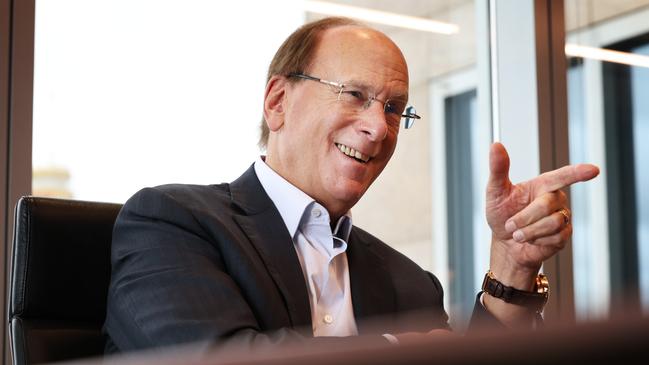Unlock the capital: The big themes from BlackRock boss Larry Fink’s next letter
Financially-stretched governments around the world need to find a better way to drive more private investment in much needed infrastructure. The BlackRock boss says markets can play a role.

BlackRock boss Larry Fink came into prominence over the past two decades through his closely watched annual letter sent to investors and CEOs that outlines the big themes influencing the $US11.6 trillion ($18.2 trillion) asset manager.
In recent years, Fink’s escalating warnings around climate change saw him leading the drive for ESG across corporates.
He’s toned down the approach in recent years, to focus on energy security and the need for the rest of the world to sit up and take note of Australia’s superannuation system to help solve the retirement crisis.
With the political and financial world being up-ended, and in the shadow of US President Donald Trump’s war on a woke agenda, there are plenty of threads that Fink is tying together for this year’s letter.
As Fink sat down with The Australian in Sydney, he gave an early insight into some of the themes he’s looking at ahead of publication next month.
The biggest of these is the challenge of how to “unlock more private capital” to fund the next wave of infrastructure.
Financially stretched governments around the world – including in Australia – need to find a better way to tap private investment. And much of it is within reach.
“Much of the themes has been what President Trump is advocating,” he says. “Let’s reduce regulation, let’s accelerate the permitting process.”
This will involve looking at the power of private markets to grow economies. Fink says while Australia has deep pools of capital sitting in its superannuation system, it isn’t being deployed significantly to back risk. This theme sits alongside BlackRock’s aggressive push into private credit, through last year’s $US12.5bn buyout of Global Infrastructure Partners.
“In my opinion, what is creating the US exceptionalism, is that we have an economy that has a strong banking system and strong capital markets,” Fink says. “And in the United States, the capital markets are bigger than the banking system by a lot.
“If you’re a start-up company, you have access to risk capital where no other country has that opportunity. Young entrepreneurs, if they have a great idea, will attract risk-capital. Small and medium businesses have an opportunity to go to a bank to get financing or go to the capital markets for private credit.
“And so the blossoming of the capital markets in the United States has really empowered the US economy. And here in Australia, you have this incredible retirement system, the best in the world – I firmly believe that – but too much of the economy rests on four or five banks.
“When you overlay the banks’ capital restrictions, they have to be more focused on their risk appetite.”
However, on the other side of the equation there’s the long-term savings with all the superannuation funds. Combine that with intense political pressure on them to invest more here, Fink says. This is where the potential lies.
The phenomenal power of artificial intelligence and robotics will get a deeper examination in this year’s letter, along with housing and the lack of infrastructure creating a supply squeeze.




To join the conversation, please log in. Don't have an account? Register
Join the conversation, you are commenting as Logout